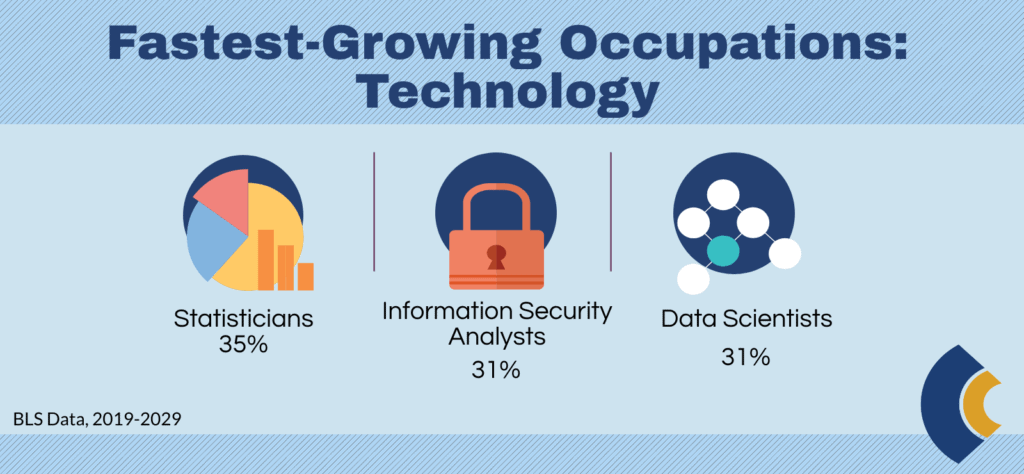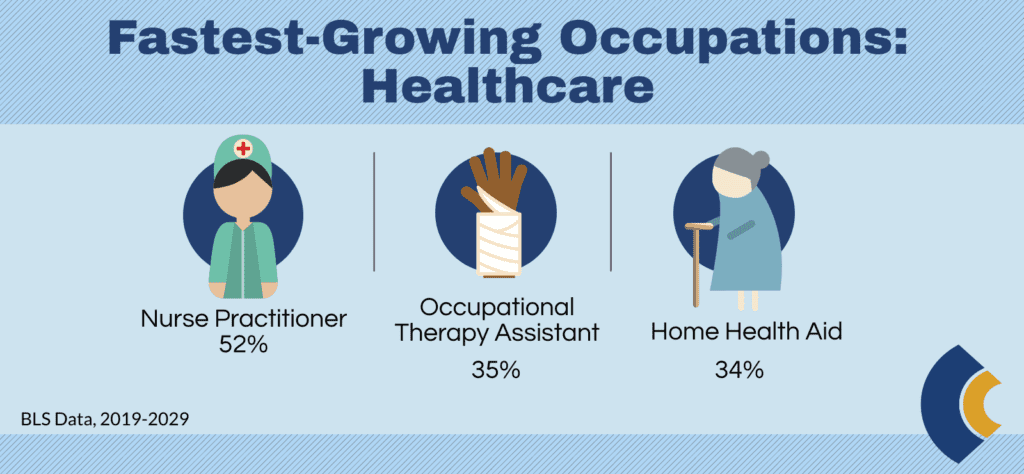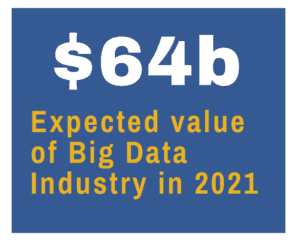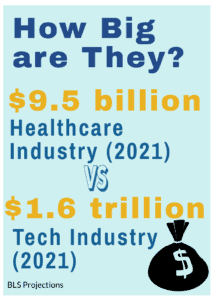The college degree program you decide to enter into is the education that defines the start of your career. You want to make the most out of your college education because it’s what brings you personal success, an excellent income and job satisfaction. However, not all degrees are created equal. Some are more in demand than others, and higher demand usually translates into better pay. Students holding their high school diploma or bachelor’s degree can make the decision to enter into a program for the college majors most in demand, but they need to have confidence that the best degrees to get now will still be in demand within the job market upon graduation.
Recommended Online Degrees
Explore our featured online programs to find the right match for you today.
Certain degrees are in high demand due to a lack of qualified professionals to fulfill the job openings. These degrees in most demand tend to require a high level of education and sometimes a lengthy educational investment. Students tend to avoid these degree options due to the perception that the demand will have faded by the time they reach graduation. The following best degrees to get are ones that are experiencing a current or projected shortfall and are well worth consideration by students who want to have successful careers with commensurate pay.

1. Bachelor of Science in Software Engineering
Career: Software Developer

The Bachelor’s Degree in Software Engineering (B. SE.) stands as one of the best degrees to get. It will teach students how to design software from the ground up and make sure it works before it’s sent to the customer or put into use. A student also has to learn about computer architecture, designing databases, how to build the software to work on the intended operating system. They learn about the operating system itself and learn calculus and algebra. The degree is heavy in maths due to the fact that computer software developers rely on mathematical concepts to work within the operating system and computer hardware.
Computer systems are here to stay and professionals in software development have a solid future in front of them. There will always be a demand for software as computer hardware architecture advances and changes, which offers a lot of future earning potential. Existing software needs to undergo changes to keep up with new hardware changes and new software will be in demand to utilize the new hardware.
Projected Jobs: 316,000
Median Salary: $107,510.00
Recommended Online Degrees
Explore our featured online programs to find the right match for you today.
2. Doctor of Medicine (M.D.)
Career: Physician
Earning a Doctor of Medicine enables a graduate to enter into the practice of medicine, and in a healthcare field of their choice. They provide health care to the population at large in order to take care of routine health issues, make sure that physical development is progressing normally, respond to emergency health needs, perform surgery, provide a diagnosis and prescribe medication to treat a condition. Physicians are the first line of defense against healthcare trauma and helping people get and stay healthy.
Physicians are in demand due to the fact there are currently three large generations who are or will be in need of health care at some point in their lives. The biggest demand comes from the aging population who seeks medical care to improve their quality of life as well as address age-related health conditions. However, the Association of American Medical Colleges is projecting a shortage of qualified physicians in primary and specialty care. It also stands as the highest paying career path, offering a high return on investment. All of these issues are increasing the demand for students to enroll in M.D. programs in medical school and make it one of the most in-demand degrees.
Projected Jobs: 18,500
Median Salary: $206,500.00

3. Doctor of Dental Surgery (DDS) or Doctor of Dental Medicine (DDM)
Career: Dentist
A Doctor of Dental Medicine (DDM) or Doctor of Dental Surgery (DDS) degree qualifies an individual to work on all of the structures in a patient’s mouth and engage in general dentistry. Both of these degrees require the same type of education with very little variation between them. In order to practice as a dentist, a student must first complete a bachelor’s degree in a field of study that’s related to the dental field.
After graduating with a bachelor’s degree, the student attends dental school for four more years. Students learn how to work on patients in a clinical setting, undergo classroom training, and train in a dental laboratory. After graduation, students must pass the National Board Dental Examination, a regional board examination, and be able to pass a state exam for licensing.
What makes the DDM/DDS one of the most in demand degrees is the fact the career field is in need of qualified dentists. People will always need dental care no matter how good at-home dental technology becomes.
Projected Jobs: 3,700
Median Salary: $155,600.00
Ready to start your journey?
4. Bachelor of Science, Healthcare Administration
Career: Health Care Management

The Bachelor of Science in Healthcare Administration (BSHA) is a management degree. This bachelor’s degree focuses on the efficient operation of healthcare facilities such as hospitals, nursing homes and clinics. The degree teaches students how to handle the business side of health care administration and the unique challenges faced by the health care industry. This career path stands among the business and financial occupations within a clinic or facility. Healthcare administrators may want to take basic medical classes to better understand their working environment. They are not required to engage in an education that is required of most medical professionals.
Healthcare management is a broad category of employment. Graduates with their BSHA typically start at the lower end of the employment ladder, but have plenty of career opportunities for upward mobility as the health care industry needs more qualified administrators. Aging populations drive the need for health care and increase the need for more people to work in the administrative side of medical facilities.
Projected Jobs: 133,200
Median Salary: $100,980.00
Featured Schools
Explore our featured online programs to find the right match for you today.
5. Master of Science in Nursing (MSN)
Career: Nurse Practitioner
The Master of Science in Nursing (MSN) is a role that falls between the Bachelor of Science in Nursing (BSN) and the Physician Assistant (PA). A student who earns their MSN is qualified to become a nurse practitioner and work at an advanced level of nursing. Earning this advanced degree opens up multiple lucrative career paths including the option to specialize in a specific field of medicine that’s open to
- nurse practitioners,
- nurse educator,
- manager, or
- administrator.
The nurse practitioner can also work one-on-one with patients in a primary care provider role.
Medical facilities are turning to nurse practitioners in order to fill positions that physicians traditionally occupy. A nurse practitioner can offer primary care and help patients with their medical complaints in the same fashion as a physician. The predicted shortage of qualified doctors has the medical industry seeking nurse practitioners to take care of patients and aid in other areas of health care.
Projected Jobs: 110,700
Median Salary: $109,820.00
Recommended Online Degrees
Contact schools for more information on enrollment, tuition, and aid

6. Master of Science, Physician Assistant
Career: Physician Assistant
The physician assistant (PA) is an individual who works under the supervision of a physician, but has autonomy to make medical decisions. A physician assistant can perform all of the duties of the nurse, a nurse practitioner, and many duties of the MD. They are trained to perform most types of procedures, assist in surgery, diagnose illnesses and treat them, order tests and interpret the results, prescribe medications based on a diagnosis, and engage in clinical research. The major difference between a PA and an MD comes down to hours spent in education and independence. A Master of Science, Physician Assistant student is not required to enter into an internship or residency and shares responsibility for treatment of a patient with the MD.
Qualified PAs are in demand due to the ongoing shortage of fully licensed MDs. The PA’s ability to perform a majority of a physician’s duties enables a medical facility to provide a high standard of medical care to patients and reserve the MD staff for work that can’t be done by a PA. The PA can also refer medical treatment to an MD when they encounter a medical issue they’re not qualified to handle. The Master of Science, Physician Assistant is one of the degrees most in demand.
Projected Jobs: 39,300
Median Salary: $112,260.00
7. Doctor of Veterinary Medicine (DVM or VMD)
Career: Veterinarian

A Doctor of Veterinary Medicine (DVM or VMD) is an individual who has learned how to treat animal species. They range from farm animals to house pets and exotics. A student is required to have an undergraduate degree with a concentration in veterinary classes prior to applying for veterinary school. Upon acceptance, a veterinary student has to study for another four years in order to learn how to treat animals. In order to work as a DVM after graduation, the student has to sit for the North American Veterinary Licensing Examination (NAVLE) and pass in order to gain licensure.
The demand for veterinarians has been strong for some time and the demand is predicted to increase as pet owners are spending more on health care for their pets. Adding to the demand is the fact there are only 28 veterinary programs in the US. This limits the amount of veterinary school graduates and makes it one of the most in-demand degrees.
Projected Jobs: 14,200
Median Salary: $95,460.00
8. Bachelor of Science, Data Science
Career: Data Scientist
A Bachelor’s Degree in Data Science is sometimes known as a Bachelor’s in Data Science and Analytics. It stands as one of the most valuable college majors. This degree includes the science of examining data for specific information, analyzing and visualizing the data. It then organizes the information into a report. These bachelor’s students learn to use programming languages, data visualization software, machine learning. They learn how to use information from major data platforms. The final results from a data scientist are used by businesses and governments in their pursuit of making sense of the amount of data they collect on a daily basis.
Data science in its current form is a relatively new field of employment that is still in a growth state due to the amount of information being collected by organizations. This data is used to determine trends and anticipate the actions of a specific population or demographic. Corporations hire data scientists to make sense out of information that isn’t easily uncovered through other means.
Projected Jobs: 10,300
Median Salary: $94,280.00
9. Master of Science in Statistics

Career: Statistician
The Master of Science degrees in Statistics is an advanced degree in mathematics and stands as one of the best college majors. It collects data for analysis, interprets the information, organizes the results, then applies the results to a specific problem. The problem may be social, scientific or industrial in nature. The problems typically involve determining potential outcomes to a given problem. In order to become a statistician, a student has to be proficient in multiple forms of math. They must also be comfortable using computer software, and capable of number theory.
Statisticians are in demand from employers who have a need for data analysis and predictions. Corporations want to make sense of the amount of information generated by individuals and turn to statistics to help them make the information understandable. The insurance industry also seeks statisticians to help identify risk factors for the types of insurance coverage they offer.
Projected Jobs: 14,800
Median Salary: $91,160.00
10. MS Speech-Language Pathology
Career: Speech-Language Pathologist

The Master of Science Degree in Speech-Language Pathology (MS SLP) focuses on the understanding of communication disorders and their treatment. A practitioner is known as a speech-language pathologist (SLP). They tend to work one-on-one with patients who are in need of help with speaking normally. The SLP evaluates a patient in order to determine the cause of the issue, apply a definitive diagnosis, then creates an appropriate treatment plan to help the patient with communication. SLPs are instrumental in diagnosing children with autism spectrum disorder (ASD) and helping ASD patients learn to communicate.
The need for speech-language pathologists is projected to grow due to the aging of the Baby Boom population. A large, elderly population means more people are likely to experience health conditions that result in speech or language impairments. They need speech therapy as part of their recovery.
Projected Jobs: 40,500
Median Salary: $79,120.00
What Makes a College Degree in Demand?
The factors that put certain college degrees most in demand comes down to the supply and demand principle. The more people are in need of a service or good, the more demand there is for people to fulfill that service or good. For example, a computer science degree is always in high demand because our high reliance upon computers and technology.
The explanation is simple, but the factors underlying the principle are not. Some areas of the U.S. have higher demand than others, but those areas with less demand are still in need of someone to fulfill a role. The areas of less demand simply require fewer people than areas of higher demand. In turn, the odds of steady employment are greater in an area of high demand. That doesn’t mean there are no jobs in areas of lower demand; instead, the career opportunities are fewer.

Entering into an educational program for the most in demand college majors positions a student for a solid future in their chosen role. By the time a shortage or demand for qualified professionals eases, a graduate will be well into their career path and have work experience that’s desired by many employers.
What Qualities Make a Degree a Good Choice for the Future?
The most in demand degrees for the future are ones that fulfill a need on an ongoing basis. The best college majors are trending in the following areas:
- healthcare
- data science
- computer and information technology
- engineering
The need for dentists, doctors, veterinarians, and computer programmers may fluctuate, but never disappear.
The best way to determine the long-term value of a degree is to assess the role against the needs of the population. An area of study that benefits humanity but lacks people to engage in it is a degree with good job prospects. Another indicator of the future value of a degree involves retirement or career change in great numbers. Some degree fields are losing people to retirement and career change. This reduces the amount of qualified individuals in that role and increases the value of graduates who are new to the field.
STEM Degree Honorable Mentions
- computer science
- computer engineering
- mechanical engineering
- electrical engineering
- computer systems
- civil engineering
- industrial engineering
- marine engineering
- management information systems
- software development
- biomedical engineering
- systems engineering
- petroleum engineering
- environmental science
Are Bachelor’s Degrees Still a Good Investment?

Yes, a bachelor’s degree is still a good investment. It will open career options and help you land better-paying jobs than if you had an associate’s degree. The role of the post-graduate degree in any given field is nuanced. Some employers won’t look at someone with multiple degrees and little work experience. An employer is more likely to be interested if candidates have bachelor’s degrees with work experience and have returned later to get their master’s degrees. That’s not to say that getting a master’s degree is pointless. It’s worth getting one of the best bachelor degrees, finding employment, then returning to enhance one’s skills and knowledge. A master’s program offers a narrower focus.
Why Are So Many People Getting Graduate Degrees?
The reasons why more people are returning to school to get their graduate degrees vary. The most common reason is the state of the economy. When the economy is in good shape, people are less likely to stay in school to earn a master’s degree. During times of economic distress, people are more likely to enter a master’s degree program. They may go from their bachelor’s degree to a master’s degree program.
Some professions require a master’s degree for employment in a specific role. They don’t shut out those who have a bachelor’s degree. Employers will hire undergrads in lesser roles while they work on earning their master’s. They offer the opportunity to gain valuable experience in the meantime.
The most in demand graduate degrees also drive people to continue their education or return to school. Employers tend to prize a graduate degree due to the specialized education that’s taught in a master’s degree program. They view the person with a master’s degree as someone who has both a broad and refined base of knowledge that can boost the organization to new heights. Employers push demand for graduate degrees through a willingness to pay high salaries. They can enjoy the promise of a solid career trajectory.
Other Top Career Paths
- Market Research Analysts
- Civil Engineers
- Financial Analysts
- Mechanical Engineers
- Chemical Engineers
- Software Developers
- Computer Engineers
- Registered Nurses
- Biomedical Engineers
- Electrical Engineers
- Chief Technology Officer
- Web Developer
- Information Systems Manager
Recommended Online Degrees
Explore our featured online programs to find the right match for you today.
Related Degree Ranking:
Highest-Paying Jobs for Women
Highest-Paying Careers for College Graduates
Highest-Paying Jobs for Millenials
Highest-Paying Online Associate’s Degrees
Highest-Paying Online Bachelor’s Degrees
Highest-Paying Online Master’s Degrees
